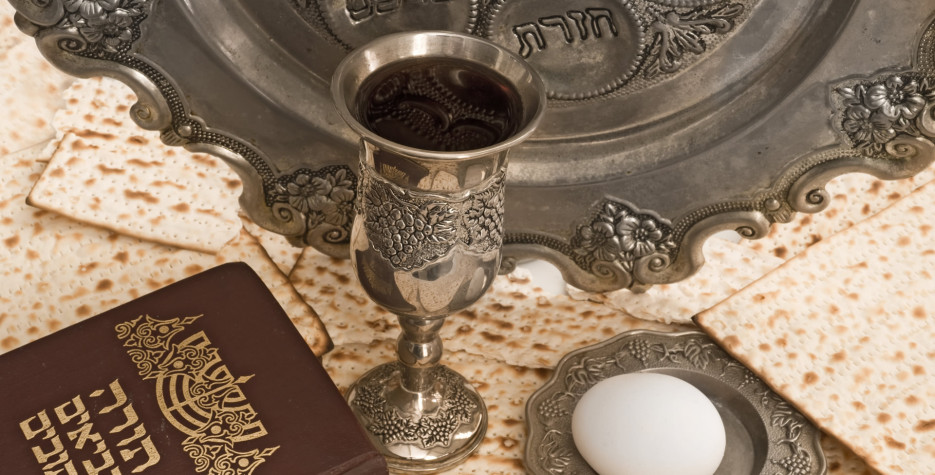When is Passover?
Passover begins on the 15th* of the Hebrew month of Nisan.
Also known as Pesach or Pesah and the 'Festival of Freedom', this is an eight-day Jewish holiday (seven days in Israel) that remembers the exodus of the Israelites from Egypt.
The first and last days are national holidays in Israel.
Traditions of Passover
Before the holiday begins, observant Jews will remove and discard all food with leavening (called chametz) from their households, doing a thorough job, so that not even a crumb remains. This tradition is called bedikat chametz.
Throughout the holiday, they will eat no leavened food, replacing bread, pastas, and cakes with matzoh and other specially prepared foods.
In the absence of leaven, Jews will eat specially prepared unleavened bread, or matzah, on Passover. Many Jews will also eat products made with matzah "flour" – unleavened bread that has been finely ground. Matzah dates back to the Exodus, where the Jews, not having had time to wait for the dough to rise before leaving Egypt, journeyed into the desert with unleavened bread.
Passover is a family holiday and a happy one. The first night is the most important, followed by the second night. It is traditional for a Jewish family to gather on both these nights for a special dinner called a seder (literally translating as "order", due to the very specific order of the ceremony) where the reading of the story of the Exodus from Egypt, the Haggadah retells the story of the Israelite exodus from Egypt.
At the seder, three matzohs are used. During the seder, the middle matzoh is broken in half. The smaller piece is returned to the set of matzohs while the larger piece is designated as the Afikomen, or the dessert matzoh. Two distinct customs have arisen regarding the afikomen, both of which involve the afikomen being hidden as a means of keeping the children interested in the proceedings. In one custom, a child "steals" it and the parent has to find it. If the parent can't find it, the child is given a reward for the return of the afikomen. In the other custom the parents hide the afikomen and the children look for it at the end of the meal. If the children find it, they receive the reward.
During the seder, a platter, called the "Seder Plate" is a main part of the dinner. The Seder Plate has on it all of the main symbols of Passover. There is a roasted shank bone of a paschal lamb called a "Z'roa" which represents the offerings at the temple at Jerusalem on Passover. It has a roasted egg called a "Beitzah" which represents the Second offerings given at the temple in Jerusalem on Pesach, Shavuot, and Sukkot/Succot. There is a green, leafy vegetable (usually celery or parsley) called "Karpas" which reminds the participants that Passover corresponds with Spring and the harvest, which, in ancient times was a cause for celebration itself. There is a dish of chopped fruits, nuts, and wine called "Charoset" which represents the mortar used by the Jews in bondage. There is dish of "maror" or bitter herbs which represent the bitterness of slavery.
There is a tradition of speaking of Four Sons. The Wise son, the Wicked son, the Simple one, and the Young one, who does not know enough to inquire. These sons represent the different types of Jews. The Wise son is the observant Jews. The Wicked son is the Jews that reject their heritage and religion. The Simple one is the Jews that are completely indifferent. The Young one is the Jews that don't know their culture or traditions and so, cannot say anything on the subject.
The Seventh Day of Passover
The celebration of the seventh day of Passover as a full holiday is specified in Exodus 12:16 and Leviticus 23:8. Festive services and readings in synagogues and special memorial prayers for the departed will be held.
Passover is a popular time to visit Israel, so transport may be more crowded than normal and hotels book up early.
With Passover creating a popular holiday period bookended by the two public holidays, Chol Hamoed is the term that refers to the middle of the holiday when most people take a vacation from work and school.
Mimouna
At the end of Passover, Mimouna celebrations take place throughout Israel. At Mimouna is a feast in which leavened food, which was forbidden to eat during Passover, is served amidst great celebration and joy. The custom was brought to Israel by Moroccan Jews and has spread to mainstream Israeli culture.
* In Judaism, a day commences at dusk and lasts until the following dusk, thus the first day of Passover begins after dusk of the 14th of Nisan and ends at dusk of the 15th day of the month of Nisan.


